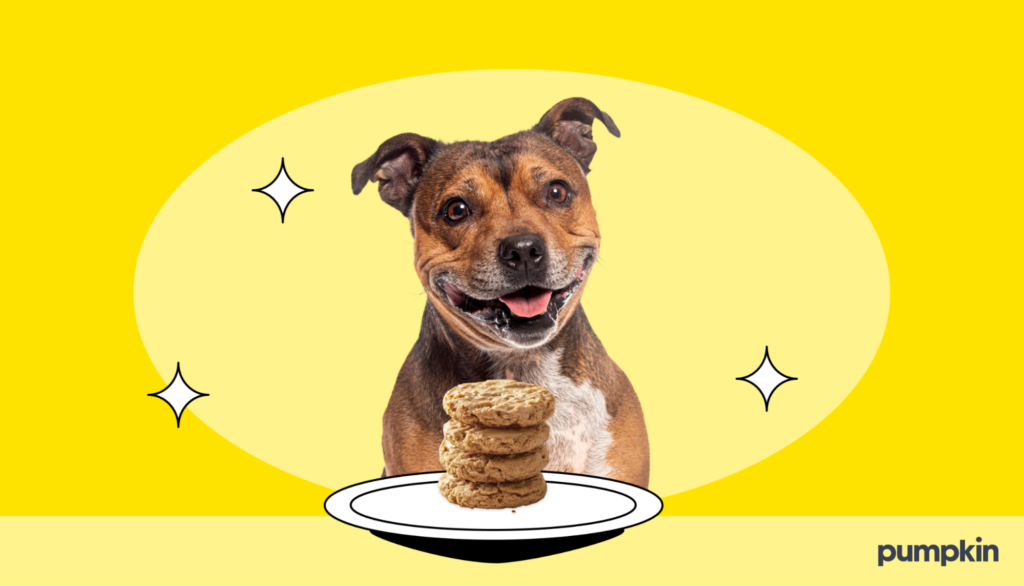- Pumpkin Team
- Nov 26, 2025
- 6 min read
Key Points
Dogs can eat peanut butter, but always ensure it’s free from harmful additives like xylitol or another sugar substitute.
Peanut butter offers protein, healthy fats, and essential vitamins for dogs.
Moderation is key; large amounts of sugar and carbohydrates can lead to weight gain and other health problems in dogs.
There’s nothing cuter than watching your dog tackle a spoonful of peanut butter, especially when your pooch is giving you those enthusiastic snarfle sounds.
But peanut butter isn’t just a snack; it’s a dog-parenting lifesaver. Whether you're stuffing it into the almighty Kong, using it as a sneaky way to hide medicine, or rewarding them with a little lick, it’s a versatile go-to for pet owners.
So, can dogs eat peanut butter? You already know they can and will at every opportunity. When your dog eats peanut butter, what matters most is choosing a safe, natural product and serving it in moderation.
Here’s a better question: Is peanut butter good for dogs?
Yes, peanut butter is a safe treat for our pups, as long as you choose a dog-safe peanut butter and serve it in moderation. Before you grab that jar, here’s the low-down on peanut butter and dogs.
Health benefits of peanut butter for dogs
Peanut butter isn’t just a tasty treat. The nutritional value makes it an excellent supplement to their diet. Here's why peanut butter is such a popular doggy snack:
Protein boost: Peanut butter is a great source of protein, which is essential for muscle growth, repair, and overall maintenance of bodily tissues in dogs.
Healthy fats: The healthy fats in peanut butter, particularly polyunsaturated fatty acids, support a shiny coat and nourish the skin.
Vitamin B complex: Peanut butter is rich in B vitamins, including niacin (B3), biotin (B7), and folic acid (B9). These vitamins help with your dog’s metabolism and skin and coat health.
Vitamin E: This vitamin acts as an antioxidant, supporting immune health and maintaining healthy skin and muscles.
Minerals: Minerals such as magnesium support energy production and muscle function, while potassium helps with proper muscle and nerve function.
Risks of overfeeding peanut butter to dogs
Peanut butter can be a great treat for dogs, but giving too much or the wrong kind can cause health problems. Here are some risks to watch out for:
Weight gain: Peanut butter is calorie-dense and high in fats. Consuming too much can lead to obesity and increase the risk of joint issues, heart disease, and diabetes.
Pancreatitis: The high-fat content in peanut butter can trigger pancreatitis in dogs, a dangerous inflammation of the pancreas.
Digestive problems: Eating too much peanut butter can cause gastrointestinal upset, including vomiting, diarrhea, and abdominal discomfort.
Xylitol toxicity: Some peanut butter contains xylitol, an artificial sweetener highly toxic to dogs. Xylitol poisoning can be fatal if not treated promptly.
Lastly, remember that not all nuts are safe for dogs. (Yes, we know peanuts aren’t technically nuts, but you know what we mean.) So before serving peanut butter alternatives like cashew butter, make sure you know which nuts are toxic to pups.
Peanut butter allergies in dogs
Though rare, some dogs are allergic to peanuts. While anaphylactic reactions are common in humans with peanut allergies, they are less common in dogs. However, it’s essential to recognize the signs of an allergic reaction and act quickly.
Look out for these symptoms of a peanut butter allergy in dogs:
Itching
Swelling
Hives
Digestive issues such as vomiting, diarrhea, or stomach discomfort
Sneezing or coughing
Watery eyes or runny nose
Difficulty breathing
Lethargy
Common ingredients to avoid
Not all peanut butter is safe for dogs. Some brands of peanut butter contain harmful ingredients for your dog. Here's what to avoid:
Xylitol
Xylitol is an artificial sweetener often found in sugar-free products, and it’s extremely toxic to dogs. Even in small amounts, xylitol can cause rapid insulin release in dogs, leading to hypoglycemia, seizures, and even liver failure.
Always check peanut butter labels for xylitol. Avoid products labeled as "sugar-free" or "low-carb," as these are more likely to contain it. Xylitol may also appear on ingredient labels as ‘birch sugar,’ so always check for both terms before offering peanut butter to your dog.
Added sugars
Peanut butter with added sugars can contribute to weight gain and obesity in dogs. It could also cause blood sugar spikes, which can lead to long-term health problems like diabetes.
Hydrogenated oils
Hydrogenated oils, or trans fats, are added to some peanut butter to extend its shelf life. These oils can contribute to obesity and increase the risk of heart disease by contributing to unhealthy cholesterol levels.
Palm oil
Some natural peanut butter contains palm oil which can act as a laxative, leading to diarrhea and dehydration in dogs. It’s also difficult for dogs to digest, causing stomach discomfort and may contribute to inflammation in the body.
Added salt
Some peanut butter brands also contain added salt, which can contribute to dehydration or excessive sodium intake in dogs. For the safest option, choose products made with unsalted peanuts to avoid unnecessary sodium.
Artificial preservatives
Steer clear of brands that include artificial preservatives, which can cause unnecessary digestive upset or add chemical compounds your dog doesn’t need.
How to prepare peanut butter for dogs
You can offer plain peanut butter as a treat, or you can use it as an ingredient in homemade peanut butter dog treats. Some dogs also enjoy the texture of crunchy peanut butter. Others do better with creamy peanut butter, especially dogs with dental sensitivity or those that need a smoother texture for enrichment toys.
Lastly, you can always add a spoonful of peanut butter to a Kong toy or a puzzle toy. You can also spread a thin layer onto a lick mat to turn it into a calming, enrichment-based activity.

How much peanut butter can I give my dog?
The right amount of peanut butter will be based on your dog’s size.
Vets recommend only 10% of a pup’s daily calories come from treats, with the other 90% from their dog food. A teaspoon (5 grams) of peanut butter is about 30 calories, making it generally safe for small dogs (12 to 24 pounds). Larger dogs can enjoy up to a tablespoon (17 grams), or about 107 calories.
Peanut butter should be treated as an occasional treat and incorporated into a balanced diet, not used as a primary calorie source.
Dog-friendly alternatives to peanut butter
Cashew butter and sunflower seed butter are potential alternatives for your dog's diet. However, always ensure they are free from the same harmful additives and introduce them slowly.
Other types of dog-safe human foods include:
Carrots (beneficial for dental health)
Blueberries (rich in antioxidants)
Chicken (lean protein source)
Cashews (in moderation and unsalted)
Many human foods are safe for dogs but you should always ensure the food doesn’t contain harmful additives or seasonings before sharing with your pup.
The bottom line: Peanut butter is a safe snack
Peanut butter can be a delightful treat for dogs when offered responsibly. Always choose natural, unsweetened varieties and serve in moderation, and consider it a treat rather than a regular diet staple.
By being informed and cautious, you can ensure your furry friend enjoys this treat without any adverse effects. Want extra peace of mind for your pet’s health? Learn how Pumpkin Dog Insurance plans can help keep your pup and your wallet protected. Pumpkin plans help cover the cost of eligible vet bills in the future — so you can focus less on cost and more on care.
Updated on Feb. 10, 2025: A previous version of this article listed improved dental hygiene as a potential benefit of peanut butter. After consulting with a veterinarian, we no longer believe that to be the case and have removed this information. A section on salt toxicity, which was previously listed as a risk of peanut butter, has also been removed.
FAQs: Dogs and peanut butter
How much peanut butter is safe for dogs?
The amount varies based on the dog’s size and dietary needs. A teaspoon for small dogs and a tablespoon for larger dogs is generally safe. Always consult your vet for personalized recommendations.
Can I use peanut butter to hide medications?
Yes, many dog owners use peanut butter as a disguise for pills. Its sticky consistency helps mask the medication, making it easier for dogs to ingest the medicine they need.
Can puppies eat peanut butter?
Yes, puppies can eat peanut butter in moderation, as long as it’s natural, unsweetened, and free of harmful additives like xylitol. Make sure your puppy is fully weaned before offering solid food and human foods like peanut butter.
References

